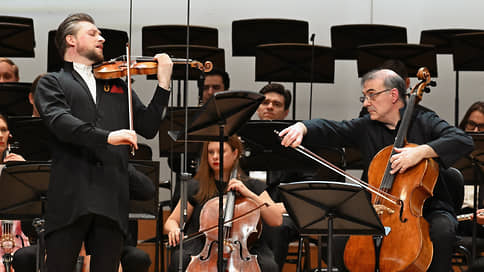Longing for illusions – Newspaper Kommersant No. 29 (7474) of 02/16/2023
[ad_1]

Cellist and founder of the Musica Viva orchestra Alexander Rudin, who in October also became the chief conductor and artistic director of the Russian National Orchestra (RNO), played with his new wards in two different halls – at Zaryadye and at the Moscow Philharmonic – two programs of different style : Russian and European, modernist and romantic. What united them tells Yulia Bederova.
After Mikhail Pletnev, founder and artistic director of the Russian National Orchestra, headed the new European Rachmaninoff International Orchestra and thus made it clear that his immediate plans were not connected with Moscow, the RNO was left without a chief conductor. Several other Russian ensembles are in the same position, and basically the situation looks frozen, but a miracle happened at the RNO: the orchestra got Alexander Rudin – also, like Pletnev, not only a conductor, but also an extraordinary soloist, a musician with a huge stylistic outlook and impeccable human reputation. Another thing is that Rudin is more like a conductor-partner than a “strong hand” with all the consequences – from total control to sole responsibility. There could be options in how relations between Rudin and RNO would develop. But the very first programs showed that everything works wonderfully, and the informal beauty and meaning of the concerts turned them into piece events.
On the first evening at Zaryadye, Rudin with the RNO, referring to the reputation of the orchestra as a bearer of the Russian tradition, but taking on the poster not cash names and titles, built a huge world of Russian music on both sides of the turn of the 19th-20th centuries and the geographical border: elegant sadness “Princesses of Dreams” (1896) by the World of Art Tcherepnin based on a troubadour story about a distant beloved was reflected in “Eight Russian Songs” for Lyadov’s orchestra with their toy fantasy and real “longing for the never-before”. Myaskovsky’s Cello Concerto of 1945 (Rudin played and conducted) sounded in the manner of “lost illusions” with its invincibly restrained sound and meaning. The finale of the Russian program was graceful and straightforward at the same time: Stravinsky’s Symphony in Three Movements (1946) not only finalized the mechanics of dreams and wars with its grotesque marches and “indescribable joy”, but, as it turned out later, prepared the finale of the next program.
The second – philharmonic – concert by Rudin and RNO appealed to the European tradition and was composed of textbook composer names – but not titles. The standard scheme of a solo concerto and a symphony served as a model, but the concert turned out to be double, and the symphony turned into a mass. Brahms’ double concerto is an elegant, lively, reckless and at the same time strict score with Beethoven’s colors, Bach’s textures and somewhat Schubertian vocal nuances, requiring the subtlest interaction of violin, cello and orchestra, performed by Pavel Milyukov and Rudin (again as a soloist and conductor) breathed and moved with amazing ensemble feeling and intonation flexibility. A couple of roughnesses of the horn do not count in comparison with the overall harmony of the balance, the beauty and precision of the wood and the half-forgotten signature Pletnev silvery sound of the strings, here framing the dark patterns of the solo instruments.
The same free musical interaction with attention to movement, detail and discipline of sound and feeling unfolded in the Mass in C major with the magnificent Intrada choir and the quartet of soloists so finely built that each voice seemed like a pearl, but did not break the evenness of the necklace. The plastic Mozart soprano of Albina Latipova, the thick but clear sound of Anastasia Bondareva, the baroque-romantic tonality of the tenor Sergei Godin, the light but not lightweight bass of Igor Podoplelov were woven into the game of changeable textures, openwork constructions, fast affects and deceptive effects, when the choir a cappella imperceptibly is colored into the tones of low strings, and woodwind patterns turn into vocal lines, and vice versa.
Beethoven wrote the Mass in C major in 1807 for Prince Nikolai Esterhazy, he tried very hard, but caused displeasure of the customer: “Dear Beethoven, what have you done here!” Indeed, in the respectable genre of the mass, having made its outline extremely laconic, Beethoven mixed in microdoses many manners, genres and styles: baroque polyphony, Mozart’s minor haze, several personal storms and pastoral light, almost Schubert’s songwriting, opera and symphony, having done a lot fantasy and new human. What is worth only one finale to the words “Dona nobis pacem” (“Give us peace”), written and performed this evening with impossible delicacy, transparency and tenderness, like a request flying from the lips. A year after the premiere of the mass, Vienna plunged into war, friends, colleagues, patrons, relatives, students left one after another. Beethoven remained in the city as if alone, and one can say that then his prayer was not heard. That, however, does not mean that today it can be neglected.
[ad_2]
Source link






